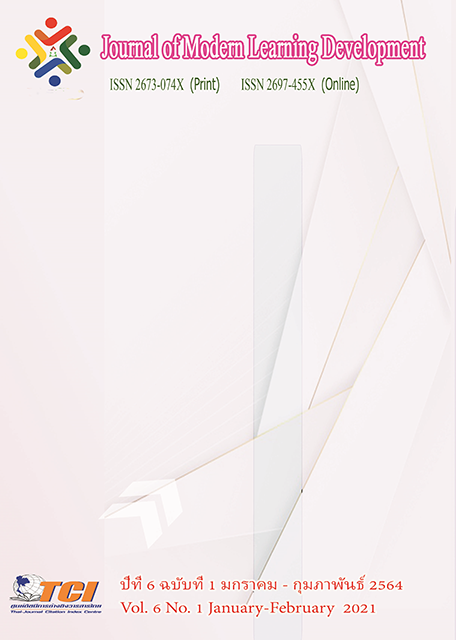The Participatory Administration of Community in Educational Institution Administration in Accordance with the Six Sālāṇīyadhammas in Phrapariyattidhamma Schools, General Education, in Mahasarakham Province
Main Article Content
Abstract
The participatory administration of community in educational institution administration in accordance with the Six Sālāṇīyadhammas in Phrapariyattidhamma Schools, General Education, in Mahasarakham Province, It is a quantitative and qualitative research. A simple random sample was drawn from 111 administrators and teachers. The research instrument was a questionnaire that analyzed data by Standard Deviation. T-value test and the one-way analysis of variance. The qualitative research analysis by doing in-depth interviews with 16 key informant, descriptive data were analyzed.
The research results were as follows:
1) The condition of the participatory administration of community in educational institution administration in accordance with the Six Sālāṇīyadhammas in Phrapariyattidhamma Schools, General Education, in Mahasarakham Province was rated at a high level of practice with a mean value of 4.37. The aspect of Diṭṭhisāmaññatā (to be endowed with right views along with one’s fellow) (harmony and agreement) was rated at a high level (mean=4.49), followed by that of Sīlasāmaññatā (to keep without blemish the rules of conduct along with one’s fellows, openly and in private), (good behavior and complying regulations) (mean=4.37), Sādhāraṇabhogitā (to share any lawful gains with virtuous fellows), (mean=4.33).
2) The model of the participatory administration of community in educational institution administration in accordance with the Six Sālāṇīyadhammas in Phrapariyattidhamma Schools, General Education, in Mahasarakham Province consisted of the following aspects: 1) loving kindness in physical actions: having compassion and goodwill to friends and knowing time; 2) loving kindness in verbal actions: having good and polite speech; 3) loving kindness in mental actions: having the Four Brahmavihāra Dhammas (Sublime States of Mind), 4) Sādhāraṇabhogitā: the administrators use the democratic and Buddhist principles in administration; 5) Sīlasāmaññatā: to work with regulations and disciplines to a good sample; 6) Administrators should give opportunities to all parties to participate and listen to their opinions.
Article Details
References
กรมสามัญศึกษา. (2540). เกณฑ์มาตรฐานโรงเรียนมัธยมศึกษา พ.ศ. 2539. กรุงเทพมหานคร: กรมสามัญศึกษา.
กาญจนา พิมพ์สุข. (2555). การประยุกต์ใช้หลักสาราณียธรรม 6 ในการบริหารสถานศึกษา ตามความคิดเห็นของผู้บริหารสถานศึกษา และครูผู้สอน โรงเรียนในเขตพื้นที่ อำเภอเมืองขอนแก่น สังกัดสำนักงานเขตพื้นที่การศึกษาประถมศึกษาขอนแก่น เขต 1. วิทยานิพนธ์พุทธศาสตรมหาบัณฑิต. บัณฑิตวิทยาลัย: มหาวิทยาลัยมหาจุฬาลงกรณราชวิทยาลัย.
จรัส ปันธิ. (2547). วิเคราะห์การประยุกต์หลักสาราณียธรรมในการบริหารงานบุคคลมหาวิทยาลัยเชียงใหม่. วิทยานิพนธ์ศิลปศาสตรมหาบัณฑิตสาขาพุทธศาสนศึกษา. บัณฑิตวิทยาลัย: มหาวิทยาเชียงใหม่.
ประเสริฐ สิงหเสม. (2549). ความพึงพอใจที่มีต่อการบริหารงานงานตามหลักสาราณียธรรม: ศึกษาเฉพาะกรณีองค์การบริหารส่วนตำบลเขาพระทอง อำเภอชะอวด จังหวัดพระนครศรีธรรมราช. สารนิพนธ์ศาสน ศาสตรมหาบัณฑิต. บัณฑิตวิทยาลัย: มหาวิทยาลัยมหามกุฎราชวิทยาลัย.
พระเทพโสภณ (ประยูร ธมมจิตโต). (2547). ทิศทางการศึกษาไทย. (พิมพ์ครั้งที่ 4). กรุงเทพมหานคร: โรงพิมพ์มหาจุฬาลงกรณราชวิทยาลัย.
พระพงษ์พัฒน์ ธีรปญฺโญ (คิดโสดา). (2556). การบริหารงานตามหลักสาราณียธรรมขององค์การบริหารส่วนตำบลขอนแก่น อำเภอเมือง จังหวัดร้อยเอ็ด. วิทยานิพนธ์พุทธศาสตรมหาบัณฑิต. บัณฑิตวิทยาลัย: มหาวิทยาลัยมหาจุฬาลงกรณราชวิทยาลัย.
สำนักงานเลขาธิการสภาการศึกษา. (2560). แผนการศึกษาแห่งชาติ พ.ศ. 2560. กรุงเทพมหานคร: บริษัท พริกหวานกราฟฟิค จำกัด.


